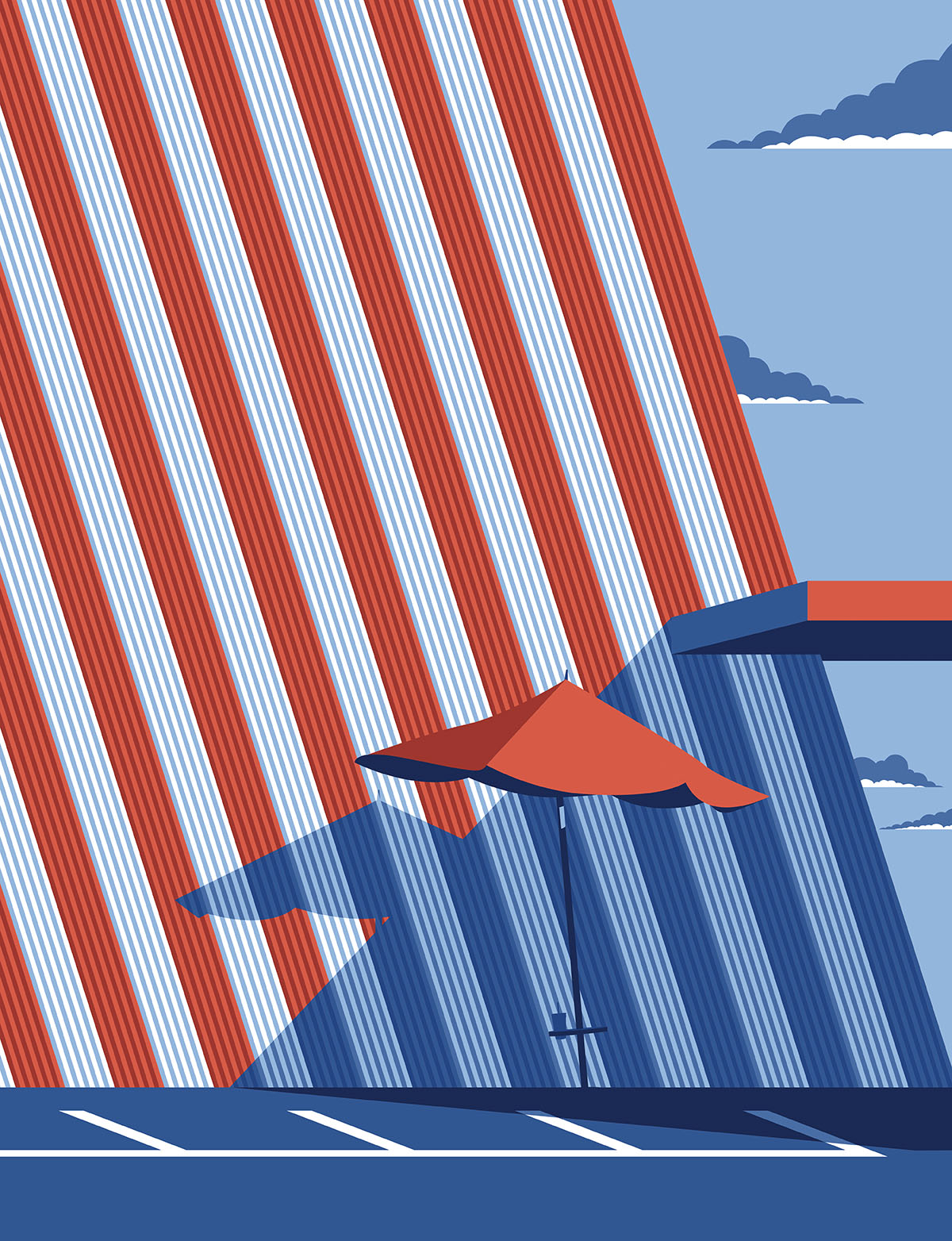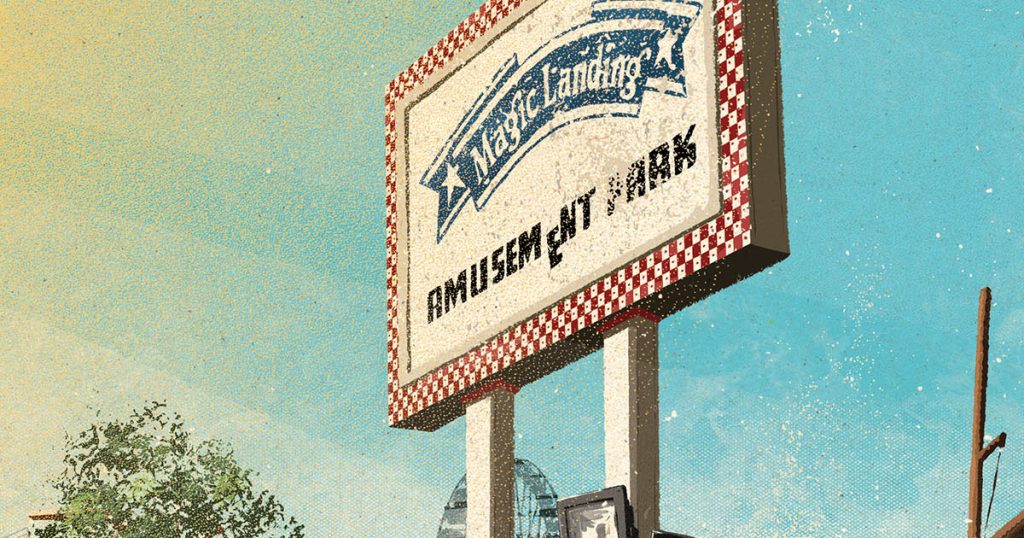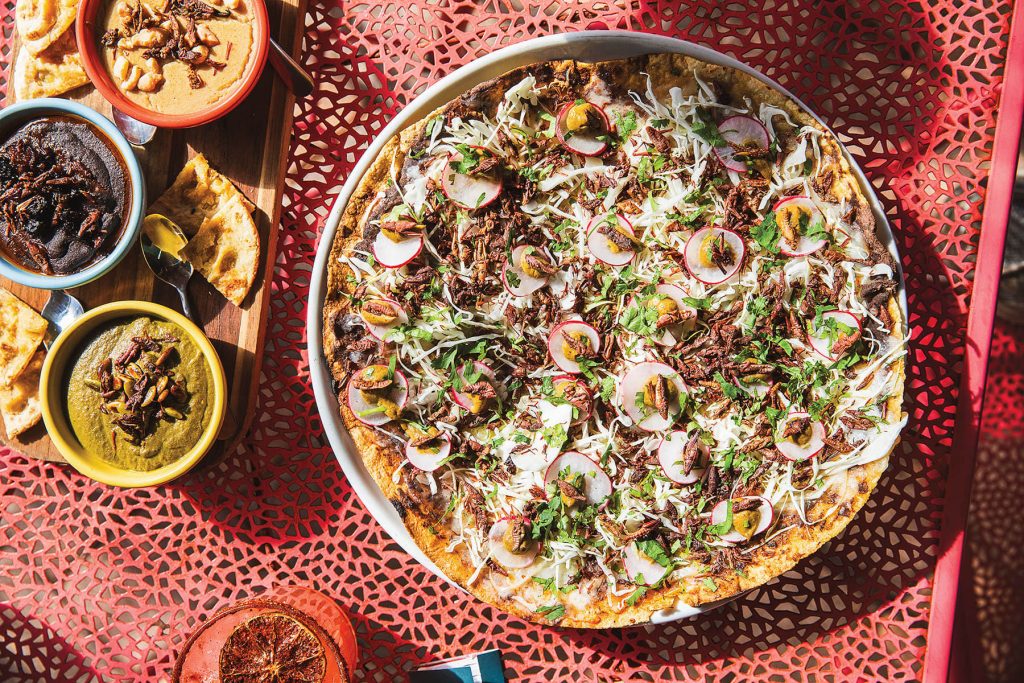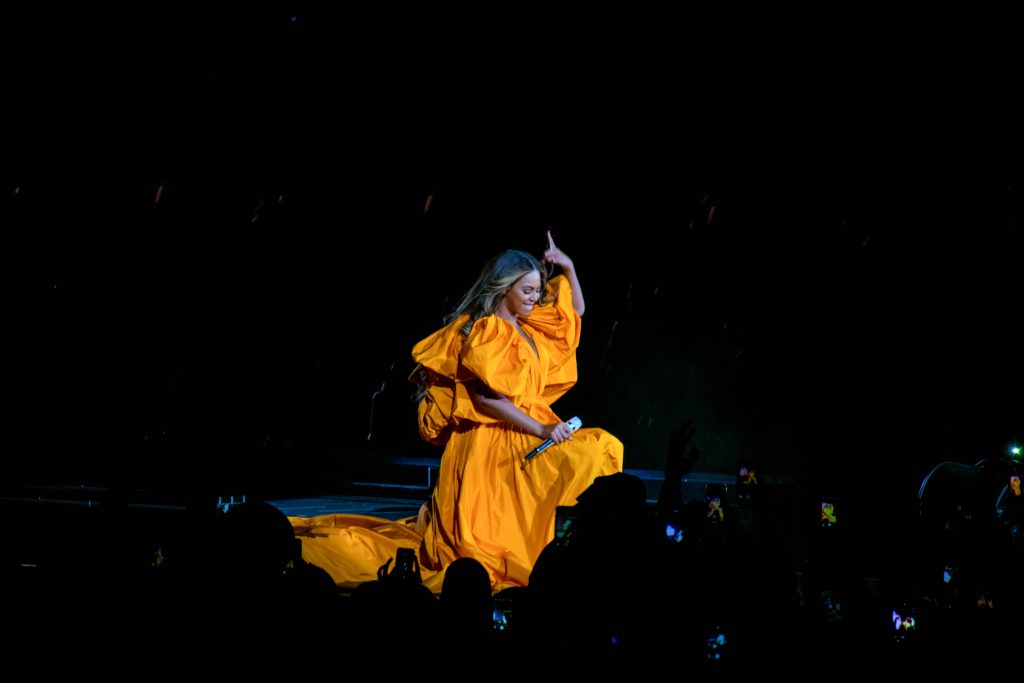
Illustration by Federico Gastaldi
Eating With My Ghosts
A Whataburger regular finds comfort in combo meals
by ire’ne lara silva
I may be slowly going pescatarian—bacon and chorizo don’t count in my mind—but you will have to pry my favorite Whataburger order out of my cold, dead hands. No place else has anything like it, especially not a fast-food chain with a drive-thru that’s reliably open 24 hours a day. The chicken breast is tender, juicy, marinated, grilled. The veggies are crisp and fresh. It’s served on a toasted wheat bun. I’m not a fan of most condiments, and this sandwich doesn’t need them.
Sure, in my almost five decades of life I’ve ordered other things at Whataburger—burgers, of course, and chicken tenders, grilled chicken salads, egg and sausage biscuits, and lots of coffee. But at my current pinnacle of wisdom, the No. 11 combo is everything.
Last spring, I attended a one-day symposium at the University of Notre Dame in Indiana. I hesitate to say it was on purpose, but I ended up sitting at a lunch table full of Texans—brilliant grad students, dedicated faculty, award-winning poets, one eminently respected elder academic scholar—and two wholly unprepared non-Texans. We could have talked about so many things, shared so many different stories, but somehow the slightly awkward getting-to-know-each-other conversation ignited when the subject of Whataburger came up. One of the grad students shared that her father had retired from a career as a middle school English teacher after more than 20 years and was now in South Texas living his lifelong dream of managing a Whataburger. The elder scholar confessed that the most painful part of his exile to sunny California was the absence of Whataburger. The non-Texans thought we were saying Waterburger. They looked taken aback as we tried to answer in unison when they asked what was so special about the homegrown chain.
Last summer, I spent almost a week in Childress. The third night, I went to bed early just to wake up abruptly at 2 a.m. Whataburger was on my mind. I realized I hadn’t seen the orange-and-white logo in more than 48 hours. The day before, I’d driven from one end of town to the other—no Whataburger. So, there I was at 2 a.m., searching online for the closest location. I found out that even though there are 726 Whataburgers in Texas, the two closest locations in the state were 115 miles to the northwest in Amarillo or 100 miles to the east in Burkburnett. I was shocked—the closest spot was further than I could legally drive in an hour.
I thought about how amazing a hot coffee and buttery biscuit would be at such a late hour, and I couldn’t make sense of why Childress didn’t have a single Whataburger. During my time there, I’d dubbed it The Town Where People Go to Sleep. It seemed there were at least 10 times more hotel rooms than residents. Hotels next to the Walmart, across from the Walmart, before and after the Walmart, but seemingly few houses despite a population of 6,800. How could a place with so many cross-state and 18-wheeler drivers not have a 24-hour place for good coffee and a reassuringly familiar menu?
Days later, on my drive back to Austin, I cheered loudly when I saw the first Whataburger sign south of Cedar Park. Austin has 21 locations. There’s one two blocks away from my apartment complex and seven locations within a 10-minute drive. In the event of a zombie apocalypse, I’d be tempted to head over to a Whataburger. I’m sure I’d find resourceful and like-minded people with whom to form a solid plan for survival. If nothing else, I’d die in Texas with a Whataburger in my hands—as a Texan should.
I felt satisfied to be home in Austin after driving 1,700 miles in eight days. To order my No. 11 Grilled Chicken Sandwich Combo and eat it in peace. Home takes many forms—sometimes it’s something you can hold, something you can taste.
No. 1 Combo: Whataburger with mustard, lettuce, tomatoes, pickles, and diced onions. Coke.
As a child of truck drivers in pursuit of seasonal harvests, I was often on the road with my family at very late and very early hours. I don’t know what we would have done without Whataburger. My mother was a loyal No. 1 combo fan. All the way. No substitutions. Nothing added, nothing taken away. Never anything else. A No. 1 at all hours of the day or night.
During those days in Childress, I realized the last time I’d been in that part of Texas was in 1998. My mother and I had decided to go on a 1,472-mile road trip. I can’t remember where my father was, but my mother said, “¡Vámonos!” And I responded, “OK!” We went from our home in Edinburg to Beeville, where we visited one of my aunts; from Beeville to Austin, where we visited two of my older sisters; then on to Amarillo to visit another older sister. The thought of that many miles didn’t faze us. My mother had been a truck driver for three decades, and I loved driving, so we took turns behind the wheel. We spent the days talking about everything and nothing, listening to conjunto and Tejano and ranchera music, and stopping for tacos and burgers. We took our chances with little taquerías that caught our eye. But burgers—no reason to risk a bad meal when we could rely on Whataburger, and my mother could have her No. 1 combo just the way she liked it.
I didn’t know she’d be gone only three years later. On Nov. 2, 2001—Día de los Muertos and my youngest brother Moisés’ 20th birthday—I drove him, my mother, and the last of her possessions from her home in McAllen to mine in Austin. It was her second bout with cancer. That September, the doctor had given her six months to live. She lasted nine weeks.
No. 2 Breakfast Combo: Two breakfast taquitos. Two half pints of milk. + No. 1 Combo: Whataburger with mustard, mayo, lettuce, tomatoes, and pickles, no onions. Large fries. No drink.
Moisés stayed in Austin from 2001 until he passed away in the summer of 2022. He was only 40 years old. His first year in Austin he lived in a studio apartment and worked temp jobs in warehouses driving forklifts and packing orders. Moisés moved in with me after a work injury and while dealing with depression and anxiety. He was diagnosed as diabetic at 23 and quickly began to suffer mobility issues and debilitating pain. At 35, his right leg was amputated. Eventually, he succumbed to infection and kidney failure. I was his only caregiver. Our siblings fell away. We lived good years and bad years and beautiful years and excruciating years.
I started writing this essay in my head the night before my trip to Washington, D.C., last April. I was driving around Austin on last-minute errands and pulled into a Whataburger drive-thru after midnight. It was an epic and yet totally routine 22-car lineup. I knew what I was going to order, but I still read over the lit-up menu. Thoughts of my brother are never far, and I felt strange ordering only for myself.
I have no idea how many times my brother and I ate Whataburger during those 20 years he lived with me. He’d tell me how he used to stop on his way to work in Austin that first year. At 5 a.m., he’d order two breakfast taquitos and two half-pints of milk from a Whataburger on an Interstate 35 frontage road. During our trips to the Rio Grande Valley, we discovered the best Whataburger in the whole world just outside Alice. It was the only point of light in the acres of darkness inhabited by crops and wild monte. All the 18-wheelers stopped there. Every meal there was Whataburger perfection, every french fry precisely golden.
We ate at plenty of other places. We were foodies before “foodie” was a thing. But Whataburger was our touchstone—in the Rio Grande Valley, in San Antonio, in Corpus Christi, and especially in Austin. During his first decade in Austin, we’d often order in the drive-thru and then park to watch cars go by. When I worked the graveyard shift, we’d sometimes have lunch together at 2 or 3 in the morning. The last time I got outrageously drunk on tequila, in 2006, he drove a carful of writers to Whataburger. I can’t remember what we ordered. I just remember I couldn’t stop laughing. When mobility issues kept him home and he was craving Whataburger, I’d journey there even though I didn’t have a car for more than a decade. I’d go on foot, on buses, in taxis.
Moisés died a little more than a year ago. There are still places that are hard to go to and meals that are hard to eat and music that is hard to listen to and movies or shows I can’t watch yet because they make the grief expand to something that is larger than my chest and louder than my own voice. It threatens to spill out or explode and leave me a smoking ruin. I hear the echoes of his absence. All I can remember are those first few moments without him, when I could still touch him but knew I’d never see the light in his eyes again, never hear his voice again, never see him delight over anything he loved again.
Whataburger was a refuge for me in those first days. When I was hungry but couldn’t cook. When I was hungry but didn’t want to dine anywhere. When I was hungry but wanted to stay in my car and eat in a parking lot and watch cars go by. The memory of all those meals together was alive and comforting. I consoled myself with the thought of how often we’d been happy eating in the car at night, talking or silent, watching the traffic and the stars and the wind in the trees amid the glowing lights.
It’s something I didn’t know before: There are places you can go where you’re never alone even when you’re by yourself.
No. 5 Combo: Whataburger ¡con todo! with bacon and cheese, mustard and mayo, extra pickles. Coke.
My friend Angelina was born and raised in Los Angeles. She’s traveled the world, is a poet and teacher, and keeps close the memory of her mother who died more than 30 years ago. The other day, I passed by a gardenia in full bloom being visited by a white butterfly. I smiled because I thought of both our mothers in that moment. Angelina says she feels her mother’s presence every time she sees a white butterfly. Whenever I see or smell gardenias, I think of my mother. Gardenias were her favorite. When she died at Christopher House, an Austin hospice for terminal cancer patients, I used a tiny vial of gardenia oil to anoint her forehead and hands.
Only in the last few years has Angelina gotten to know Texas, the land her father is from. He left when she was 5, and it was 40 years before she sought him out and pursued reconciliation. We met at an academic conference on her first trip to Texas and became friends. It’s important for me to introduce my non-Texan friends to Whataburger. Although Angelina should stay away from gluten, that hasn’t kept us from all kinds of eating adventures in Texas, New Mexico, and California. And it sure didn’t keep us from our First Annual Whataburger Feast in El Paso. We had dinner reservations for my favorite expensive restaurant in El Paso, but we made a spontaneous decision to cancel, take naps, and have Whataburger instead. She had the No. 5 combo just the way she liked it, and I had my favorite, the No. 11.
Over time and through struggles, we’ve become the best of friends. The kind you know you’ll have till the day you die—and maybe even after. It’s been a recent thing in my life to love friends without edges or limits. I don’t know if unconditional is the right word. I want some way to say to love without holding back, without hesitation.
My brother taught me how to love like that. While others only saw the financial struggles that forced me to take on multiple jobs, the constraints on my personal freedom, and the overwhelming amount of doctor appointments and prescriptions for us both, what I lived was different. I was his whole world. He believed in me like no one ever has or ever will. He loved me like no one ever has or ever will. He was my best friend, my best reader, my ardent supporter, and my wise counsel. After the amputation in 2017, he teetered on the edge of death for two months, during which we forgave each other everything and then lived the happiest years of our lives.
Angelina was one of the friends who came into my life after I learned to love without holding back, without hesitation. I see gardenias and white butterflies and think of my mother and Angelina’s. Angelina now makes frijoles a la charra for her South Texan father the way my mother taught me to make them. We share an obsession with urracas and the way they swoop and call and boldly stare. When I told her I was writing an essay about Whataburger, she sent me snapshots of a Whataburger sketch she was working on.
No. 5 Combo: Whataburger with bacon, cheese, mustard, lettuce, tomatoes, pickles, grilled onions. Toasted bun. Jalapeños on the side. Coke. Three ketchups—two regular and one spicy.
Before October 2021, I had never witnessed anyone feed Whataburger to three or four dozen poets at the same time. I never imagined I would live to see it. Poets are notoriously hungry creatures, but the loud crinkling of wrapping paper and the rrrippps of ketchup containers and the cries of happiness were coming at me from all directions. I didn’t see my friend Octavio eating—I just saw him directing The Devouring of Burgers as if he was the First Whataburger Santa handing out presents.
Octavio told me one of the most beautiful things I’ve ever heard. He was messaging me about a dream he’d had of his late father. I mentioned I had just been thinking about his dad. Over the years of our friendship, I’ve heard so much about him that it sometimes felt as if I’d known him even though we’d never met. He was a hard worker, an honorable man, and a loving father. I told Octavio I was carrying the memory of his dad. I’ll never forget how Octavio replied: “It’s the same way I carry your brother. Other people’s dead sometimes become our dead.”
Octavio never met Moisés, but he’s heard plenty about him. When I was working on the eaters of flowers, the book of poetry I wrote after losing my brother, Octavio was the first person I let read each poem. On the day Moisés died, when friends were calling and I kept crying and crying and crying until I didn’t have the strength for even one more tear—on that day, Octavio told me something stupid and made me laugh. I don’t know if I could have made it through the day without that bark of surprised laughter.
I still owe Octavio a meal at Whataburger. The man is particular about his order. I’ve never heard anyone be so specific about the number and kind of ketchups required for their meal. At this point, I probably also owe him about 87 tacos and 39 beers. I’m not sure how many he owes me. We’re at the point where it doesn’t make sense anymore to keep track of who owes who what.
Infinity Combo: Everything that comes and goes. Hatch green chiles, A. 1. Sauce, Honey BBQ Sauce, Whatacatch fish sandwich, etc.
When we think of love and friendship, we think of kinship and laughter and comfort. We think of adventures and shared experiences. We think of seeing each other through hard times and sad times. We think of celebrating important markers in our lives. We think of the passing years and how we change and learn and grow closer or further apart. But how often do we think about the other essential tasks of love and friendship: to carry each other’s dead, to carry each other’s memories, to carry each other’s losses?
When I met my friend Deborah, we shared the loss of our mothers, gone in the same season of the same year. Almost 20 years later, she mourned the loss of her granddaughter as I mourned the loss of my brother. There are other friends whose siblings, parents, children, spouses, and partners I mourn along with them. And though I say carry, I do not mean burden. What I carry, what we carry for each other, is not heavy. It is the weight of love—immense, overwhelming, beautiful, ever-expanding, and forever alive.
How can I not love the memory of the people my loved ones have loved? That love made them who they are. That love made me who I am. The love of all our lost ones taught us how to love—is still teaching us all how to love. Because even though they are gone, that love still lives in us.
I finally have an answer for all the non-Texans who have asked me what it is about Whataburger that makes it so essential. Why it is that even when I don’t say its name, I always mean Whataburger whenever I mention a burger in a poem or a story. Why I might not ever be able to live very far from where I can see that distinctive A-frame and orange-and-white color combo. Why I’m immeasurably charmed when I see Whataburgers that have special truck and trailer parking. Why I’ll go way out of my way for Whataburger coffee.
Because Whataburger is life.
ire’ne lara silva’s Open Road essay “A Place Before Words” appeared in the September 2020 issue. It was nominated for a National Magazine Award and won the 2021 Texas Institute of Letters Edwin “Bud” Shrake Award for Best Short Nonfiction.








